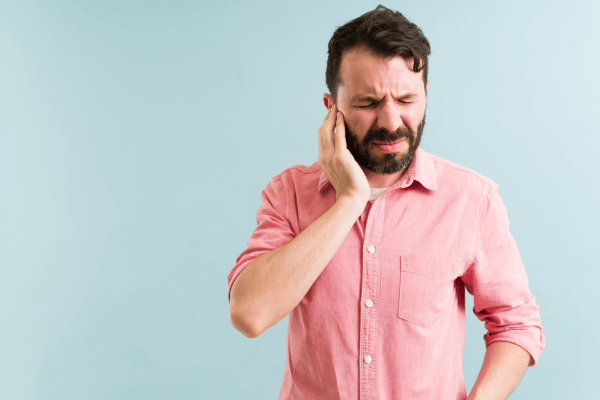Are Fluttering Sounds in the Ear a Cause for Concern?

Have you ever felt like you can hear a small fluttering of butterfly wings in your ear? It’s a weird sensation and can leave you wondering what’s going on as it disappears as quickly as it arrived.
It’s normal to hear noises in your ear that aren’t normally present after being at a loud event like a concert or sporting event. You can hear temporary buzzing or humming sounds, but it tends to go away somewhat quickly. If it doesn’t, could there be something more going on?
Your ear is so intricately designed with many tiny working parts to help you hear properly as well as balance. When something is off, even something small, you notice! These disturbances tend to become more than an annoyance as time goes on, truly affecting your quality of life.
Should You Be Worried?
One of the first things your mind goes to when you experience a change in your hearing is “is something wrong”? It can be worrisome and cause anxiety the more you think and about it and the possible reasons you’re hearing these sounds. You may experience a lack of sleep, depression, reduced work, or school performance. The good news is that even though it’s a very strange feeling, it’s usually not a warning sign of something serious going on.
It can however be extremely bothersome when you’re at work or even hanging out with friends. Let’s look at some of the reasons you’re experiencing a fluttering in your ear(s) and when you may need to get it checked out.
Common Causes of Fluttering Sounds
Usually, the fluttering sound you have heard a couple times only happens once or twice and then never occurs again. Other times, it may not go away without treating the underlying cause. Below are some examples of why that fluttering might be happening:
- Earwax Buildup – If you have too much earwax being produced in your ear or accidently impact earwax while cleaning your ears with a Q-tip, it can lead to wax buildup. When this happens, a blockage occurs in the ear canal making it hard to hear and can possibly cause an ear infection or discharge to come from your ear.
- Ear Infection – Infections can be painful – just ask your baby or small toddler! Ears can become extra sensitive (especially when you lay down) and make you hear things a bit differently than you normally would, including a fluttering or rumbling sound.
- Tinnitus – You may know this as a ringing in the ear, but some people describe it as a buzzing, thumping or even fluttering sound. It can occur in one or both ears. You can experience acute and chronic tinnitus or tinnitus that comes and goes from time to time. It can even last for months or years. It’s important to note that tinnitus is a symptom of another condition and so you need to talk to your doctor about your symptoms.
- Eustachian Tube Dysfunction – Besides experiencing a fluttering sound, if you’re feeling pressure in your ear, tinnitus, muffled hearing, or temporary hearing loss you could be experiencing eustachian tube dysfunction. This can happen when the tube (eustachian tube) that connects the back of the nose to the middle ear is inflamed and has a hard time opening and closing properly.
- Middle Ear Myoclonus – This condition occurs when there are dysfunctional contractions that happen in the muscles of the middle ear. These contractions lead to a fluttering sound or symptoms of tinnitus (ringing in the ear).
- Meniere’s Disease – Affecting the inner and middle ear, Meniere’s Disease causes sounds in the ear, hearing loss, and vertigo. Many people feel a fullness in their ears and hear a fluttering or even a roaring or rumbling sound.
These are just a few examples of conditions that may cause a fluttering sound in your ear. There are other conditions that don’t concern the ear at all though. Things like high blood pressure or an underactive thyroid could cause fluttering sounds too. Always talk to your doctor if you are concerned.
When to Be Concerned
Ear fluttering sounds are usually just annoying, but if it persists, you should probably make an appointment with your doctor to be sure of what could be causing the annoyance so that it and the condition causing it can be treated. Your doctor will be able to find a treatment plan individualized to your symptoms and condition.
If you experience a high fever or have discharge coming out of your ear, seek immediate medical attention. Finding the underlying cause of those fluttering sounds or experiencing hearing changes is important. Your medical doctor or audiologist will investigate what’s going on by asking you questions about the medications you take, lifestyle choices and more. Your doctor may also want to do some tests including a:
- Hearing test
- MRI
- CT Scan
- Blood vessel study
Treatment Options
Depending on the cause of the fluttering sounds, treatment options can range from medications, nasal douching, and surgery. Other treatments may include:
- Ear irrigation and wax removal to unblock the ear canal
- Steam treatments to help with sinus congestion
- Eating/drinking habit changes. Drink more water to avoid dehydration and eat a nutritious diet that includes the needed daily calcium and magnesium.
- Lifestyle changes which include getting good sleep each night, practicing yoga, meditation, and taking time out for yourself to relax and slow down.
- Medications including diuretics, allergy medication, decongestants, antibiotics, and more.
- Nasal sprays
- Hearing aids
- Ear injections
- Surgery
- Behavioral therapy including relaxation methods and help coping with possible anxiety and depression.
Let Us Help
Anxiety, stress and worry over any kind of hearing changes that you are experiencing is normal. It’s not something you have to just try to ignore though. The hearing specialists at Fairfax Hearing Center know how to help you make sense of your hearing concerns and treat you appropriately.
Contact Fairfax Hearing Center to learn more about our hearing specialists, services, and hearing solutions we offer. We look forward to calming your fears and helping relieve the symptoms you are experiencing.

